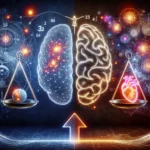**Unlocking the Links between IQ and Moral Reasoning: A Deep Dive into Cognitive Capabilities and Ethical Judgment**
In the intricate landscape of psychological assessment, the Intelligence Quotient (IQ) remains one of the most discussed and studied measures of cognitive abilities. While it primarily aims to gauge reasoning, problem-solving, and intellectual potential, recent research has embarked on a compelling journey to unravel its association with seemingly distant domains, notably moral reasoning. The groundbreaking study titled “Relationship between IQ and Moral Reasoning” has opened new horizons in understanding how our cognitive capacity might intertwine with our ability to navigate the complex world of moral decision-making.
**Understanding IQ and Its Dimensions of Assessment**
For decades, IQ tests have served as a cornerstone for evaluating intellectual prowess, encompassing verbal comprehension, working memory, perceptual reasoning, and processing speed. Individuals, educators, and psychologists leverage these tests to gain insights into a person’s potential for learning and understanding abstract concepts. From educational placements to employment screening, IQ scores have been employed as a predictive tool for academic and professional success. But, could they also shed light on one’s moral compass?
**Deciphering the Study: How Cognitive Capacity Influences Ethical Choices**
The fascinating “Relationship between IQ and Moral Reasoning” study examined individuals across a broad IQ spectrum to evaluate if, and how, their intelligence levels might correlate with their sense of morality. Researchers hypothesized that higher cognitive abilities could facilitate more nuanced and principled ethical deliberations. The hypothesis was rooted in the premise that intellectual faculties could empower individuals to process complex moral dilemmas more proficiently, and perhaps, more empathetically.
**Key Findings: Cognitive Complexity and Moral Sophistication**
The study revealed that individuals with higher IQ scores often demonstrated more advanced moral reasoning skills. This trend suggests an affiliation between cognitive complexity and moral sophistication, indicating that those with greater intellectual capacity may possess a heightened awareness of moral nuances and consequences. The implications of these findings propel discussions on whether intellectual training could foster moral development, pushing us toward more ethically-informed societies.
**Beyond Black and White: IQ’s Role in Understanding Gray Areas in Ethics**
One of the crucial takeaways from the research is the pivotal role of IQ in discerning the proverbial ‘gray areas’ in moral reasoning. Contrary to simply parsing right from wrong, higher IQ individuals seemed better equipped at recognizing the gradations of ethical scenarios, emphasizing empathy and broader societal impact in their reasoning. It suggests that cognitive skills may provide a scaffold to balance personal convictions with collective well-being, a crucial skill in today’s interconnected world.
**Implications for Education and Beyond: Fostering Ethical Minds**
This study unravels potential implications for educational systems and policy-making. Educators could integrate cognitive development programs with ethical reasoning curricula, working towards nurturing minds that can reason with both intelligence and morality. Equipping children and adults with the tools to think critically could serve as a stepping stone in developing leaders and citizens who value ethical considerations in their actions and decisions.
**Conclusion: The Synergy between Intelligence and Morality**
The link between IQ and moral reasoning is both intriguing and intricate. While cognitive abilities do not dictate morality, their influence over our capacity to grapple with ethical complexities cannot be overlooked. The “Relationship between IQ and Moral Reasoning” study enriches the narrative of human intellect and morality, reminding us that the true measure of intelligence might just be reflected in the goodness of one’s actions. As we continue to dissect the threads connecting various domains of human functioning, these insights bolster the ongoing exploration of the human psyche, with the promise of fostering societies grounded in both wisdom and principle.

